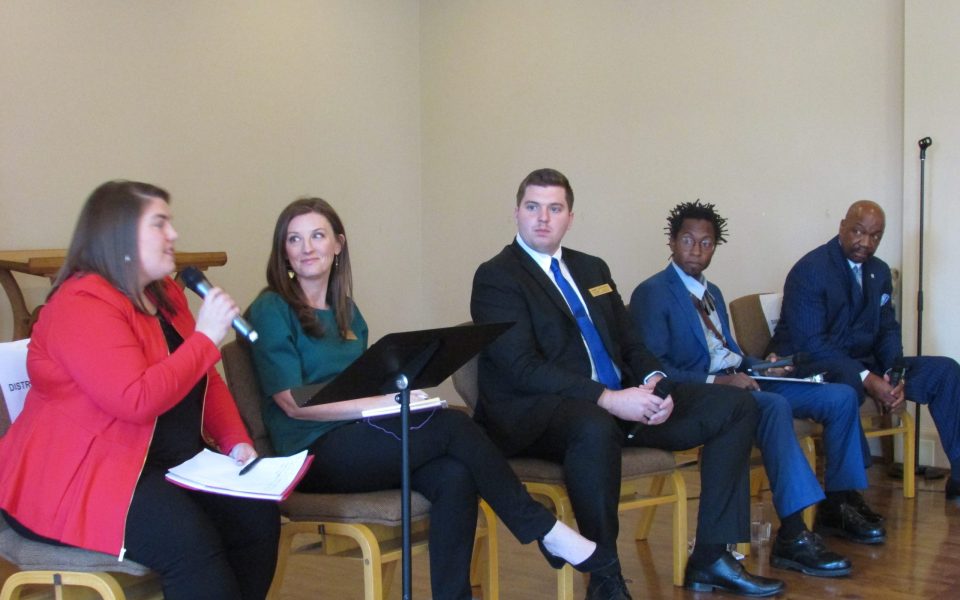For Dafne Cruz, who was born in Mexico but raised in North Carolina, the promise held out by one of her teachers at the end of her junior year was tantalizing, but her hopes were soon dashed.
The Say Yes program, launched this year with the support of Guilford County and the cities of Greensboro and High Point, was sold to the public on the premise that it would provide “last dollar” financial aid so that every student in Guilford County Schools could attend college.
“When she told us about Say Yes, I was so excited, so full of hope,” said Cruz, a senior at Western Guilford High School who holds a 3.9 GPA. “I know I can’t pay all of my college costs. This was my opportunity to make a successful start at life. No one else in my family has attended college. I will be the first in my family to go to college.”
Cruz joined three other young women on Sept. 12 as hundreds of their peers streamed past for a college fair sponsored by Say Yes to Education Guilford at the Greensboro Coliseum Special Events Center to highlight the fact that they are not eligible for the program. To qualify for the Say Yes scholarship, they must use the Free Application for Federal Student Aid, which is out of the question because as undocumented persons they don’t hold Social Security numbers.
“Everybody in my school — teachers, principals — said, ‘Seniors, this is your opportunity to go to college,’” Cruz recalled. “That’s not true. I had to inform my counselor that because I’m undocumented I can’t take advantage of that opportunity.
“You think it’s for everyone,” she added. “Say Yes is lying to you, saying, ‘We’re going to help all students go to college.’”
Guilford County School Board Chairman Alan Duncan caught the tail-end of the protest, and listened with sympathy to the students’ testimonials.
“Their message is important,” he said. “I hope the legislators are listening.”
He noted that the school board passed a resolution two years ago taking the position that students who obtain Deferred Action for Childhood Arrivals status from the federal government ought to be able to attend public universities in North Carolina at in-state tuition rates. The difference is significant — $8,834 for North Carolina residents, compared to $33,916 for their out-of-state peers. Under both Democratic and Republican leadership, the state General Assembly has refused to grant in-state tuition to undocumented students, many of whom have never known life outside of North Carolina. According to the National Conference of State Legislatures, 18 states — including Connecticut, New York, New Jersey, Maryland, Florida and Texas — allow undocumented students to attend public universities at in-state levels. Virginia started offering in-state tuition to those covered by Deferred Action for Childhood arrivals in 2014.
Donnie Turlington, a spokesperson for Say Yes, granted that the message promoted at the outset could have been more calibrated, adding that people shouldn’t look at the scholarship program as a “silver bullet.” He said Say Yes is trying to find other ways to help undocumented students.
“Maybe we should focus our message to say, ‘Don’t give up; there’s schools we know of that maybe you don’t know about that might be able to help you out,’” he said. “We can’t change the scholarship model overnight.”
Among the 44 private colleges represented at the fair, Turlington said there were 10 to 12 “that would love to talk to” the undocumented students “if the scholarship is not a fit.” The dozen institutions, including Trinity College, accept undocumented young people under the rubric of “international students.”
“The majority of our undocumented students are on full financial aid and can’t qualify for federal loans,” said Angel B. Perez, vice president of enrollment and student services at Trinity. “We work really hard to support our undocumented students in other ways, too. They can’t do internships, they can’t study abroad and they can’t do work study because we can’t pay them federal funds. So we find other ways to make it work for them.”
Perez said educating undocumented students falls well within Trinity College’s values.
“A big part of our mission is a global education,” he said. “I think we would be irresponsible if we did not expose all students to different types of people — from international students and undocumented students to low-income students and wealthy students. We’re in Hartford, and there are a lot of undocumented students in our community. We want to give back to our backyard, so we accept a lot of undocumented students from Hartford.”
The idea of the state setting up barriers to prevent young people from receiving an education is curious, and Perez said he was surprised to learn that North Carolina does not offer in-state tuition to undocumented students.
“When they told us that, you should have heard the gasp in the room,” he said. “Many of the colleges here are giving out scholarships to undocumented students. And all of us support education for students of all backgrounds.”
Join the First Amendment Society, a membership that goes directly to funding TCB‘s newsroom.
We believe that reporting can save the world.
The TCB First Amendment Society recognizes the vital role of a free, unfettered press with a bundling of local experiences designed to build community, and unique engagements with our newsroom that will help you understand, and shape, local journalism’s critical role in uplifting the people in our cities.
All revenue goes directly into the newsroom as reporters’ salaries and freelance commissions.


Leave a Reply